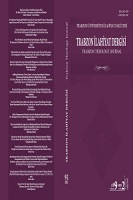Kur’ân’da İlâhî Otoriteyi İfade Eden İsimler -Esmâ-i Hüsnâ Rivâyeti Özelinde
Names Expressing Divine Authority in the Qur’ān -Special to the al-Asmā al-Husnā Narration
Author(s): Fatih ÖzaktanSubject(s): Islam studies, Qur’anic studies
Published by: Karadeniz Teknik Üniversites - İlahiyat Fakültesi
Keywords: Tafsīr; Qur’ān; al-Asmāʾ al-husnā; Al-Qadeer; Authority;
Summary/Abstract: In the Qur’ān and hadīths, there are names, adjectives and compounds that introduce Allāh. In the Qur’ān, attention is drawn to the existence of Allāh’s names with the combination of al-asmā al-husnā in four verses. Although these names appear in different surahs and verses in the Qur’ān, they are mentioned together in the narration of the al-asmā al-husnā narrated by Ibn Mâce and Tirmidhī. In this study, the names mentioned in the Qur’ān and in the list of Ibn Mājah and Tirmidhī and expressing the divine authority directly, are discussed, names that are not directly related to the authority of Allāh are not included. With this study, it is aimed to categorize the names that express the divine authority in the narration of al-asmā al-husnā and to draw attention to the divine authority, which is actually the main theme in the narrative of tawhid and prophecy, which is a common topic in almost every chapter of the Qur’ān. In the verse, it is also aimed to determine the connection and harmony of the divine names, which seem independent with the previous one, with the verse and the meaning they add to the sentence. In line with this aim, semantic analyzes of the names related to divine authority were made, it was determined how many times they were mentioned in the Qur’ān, to whom they were used, and in which period they were revealed, and their relationship with the previous verses was examined in terms of the science of the Munasabah al- Qur’ān, by applying to the source works, In al-asmā al-husnā, the names al-Azīz/All mighty, al-Qawee/The powerful, al-Jabbār/The all compelling, al-Muqtadır/The Powerful, al-Qadeer/The Omnipotent One, al-Mālik/The eternal lord, al-Qayyoom/The Sustainer, sometimes appear at the end of the verse, sometimes in the middle of the verse, expressing the authority of Allāh. It has been seen that the seven names expressing divine authority are not randomly placed in the verses, they have a close semantic connection with the verses before them, sometimes they certify the meanings before it, and sometimes they give the reason for the previous expressions. In particular, it should be noted that Allāh has used a meaning and style that states that he does not adhere to the principle of causality in order to make the interlocutor feel his authority, especially through the al-asmā al-husnā that come at the end of historical stories and news.
Journal: Trabzon İlahiyat Dergisi
- Issue Year: 9/2022
- Issue No: 2
- Page Range: 242-276
- Page Count: 35
- Language: Turkish

